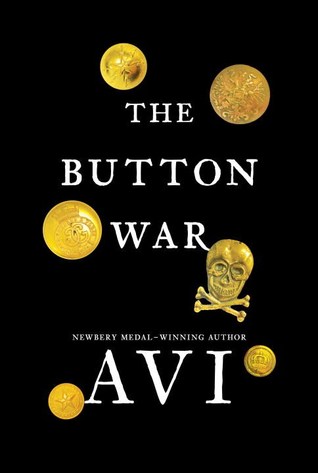 Avi. The Button War.
Avi. The Button War.June 12th 2018 by Candlewick Press
E ARC from Netgalley.com
Patryk lives in a small Polish town in 1914. The Russians have been in control for a number of years, but rumor has it that German soldiers are on their way. When a new fangled aeroplane blows up the school, everyone knows that war is on its way. Jurek, whose family is poor, becomes interested in buttons from soldiers' coats after finding one in an abandoned castle in the woods. He makes up a contest, with a cane as the prize, and says that whoever has the most interesting buttons will be the king. Patryk's friends, boys of the same age but sometimes different backgrounds, all go about getting buttons in a variety of dangerous ways. Some take the buttons off uniforms that a sister is laundering, others cut them off clothes that are hanging on the line. As the war closes in, buttons are even taken off of dead soldiers. There are seven boys at the beginning, but as both "wars" continue, some are killed in various altercations with the military, and it is even suspected that Jurek has killed one. Is he really unbalanced? Patryk's family eventually decides they must leave, but Jurek and the button war stay with Patryk in disturbing ways.
Strengths: There is not a lot of writing about the area that was and became Poland, especially during this time period. The details about life at the time, and the description of the village, are very interesting. I also liked the way the boys played together. It might seem silly to some, but I can remember going to weddings with my cousin and being obsessed with removing decorative bells and things from the wedding cake when we were about ten. There is something about small objects that appeal greatly to children, so I had no trouble believing that this fact, along with the aspect of daring ones' friends, would motivate the boys to put themselves in unreasonable danger to obtain the buttons. Intriguing story.
Weaknesses: There needed to be a lot more information about the history of Poland and about what the political situation was at the time. I required a half hour conversation with a history major friend to pin down important details.
What I really think: Debating purchase. It was an interesting book, but was lacking some important information, and I'm not sure how well it would do with my readers. At best, it would require hand selling, since the cover really doesn't indicate that it is a book about WWI.
 Mitchell, Jane. Without Refuge.
Mitchell, Jane. Without Refuge.April 1st 2018 by Carolrhoda Books
Public Library Copy
Ghalib and his family are tired of the war in Syria and the negative effects it is having on every aspect of their lives. His father ran a local pharmacy, so the family is well off and has essentials, so when they decide to leave, they have more options than some, even if those options aren't great. The other benefit is that the family is able to leave all together with the exception of a cousin who was injured, and the adult staying with him. They make it to a town that is a little better off, but decide to press on. At one point, Ghalib is separated from the rest of the group, looking for his new friend Saafa, and eventually ends up in a refugee camp. His family eventually makes it, and even though they are all crammed into a tent with several other families, the children are glad to have stability and don't want to leave. The father has planned all along to try to get to Europe, however, so they press on, taking a perilous sea journey to Greece. Once they have arrived safely there, there is still no guarantee that they will be granted asylum.
Strengths: This had a lot of good descriptions of how war torn the country is, and also about the vast amount of planning that has to go into fleeing a country. Refugees need to have a lot of resources to successfully relocate, and it's not easy even with those resources. In the case of Ghalib's family, it did make items like transportation and food much easier. This moved quickly and has some nice details, like Ghalib's friendship with Saafa and his cousin's disabilities. The characters are all named after children who were killed due to the war, and descriptions of their real life counterparts are listed at the back.
Weaknesses: This didn't pack the emotional punch of Gratz's Refugee or Senzai's Escape from Aleppo, but offered the details of flight like Abawi's The Land of Permanent Goodbyes without the intense parts.
What I really think: I'll buy a copy not only for demand now, but for ten years down the road when I might start to see a lot of children of Syrian origin in my library!

























No comments:
Post a Comment